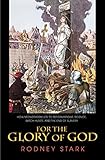For the Glory of God : How Monotheism Led to Reformations, Science, Witch-Hunts, and the End of Slavery / Rodney Stark.
Material type: TextPublisher: Princeton, NJ : Princeton University Press, [2015]Copyright date: ©2004Description: 1 online resource (504 p.) : 30 halftones. 13 tablesContent type:
TextPublisher: Princeton, NJ : Princeton University Press, [2015]Copyright date: ©2004Description: 1 online resource (504 p.) : 30 halftones. 13 tablesContent type: - 9780691119502
- 9781400866809
- 201.4
- online - DeGruyter
- Issued also in print.
| Item type | Current library | Call number | URL | Status | Notes | Barcode | |
|---|---|---|---|---|---|---|---|
 eBook
eBook
|
Biblioteca "Angelicum" Pont. Univ. S.Tommaso d'Aquino Nuvola online | online - DeGruyter (Browse shelf(Opens below)) | Online access | Not for loan (Accesso limitato) | Accesso per gli utenti autorizzati / Access for authorized users | (dgr)9781400866809 |
Frontmatter -- Contents -- Illustrations -- Acknowledgments -- Introduction: Dimensions of the Supernatural -- 1. God's Truth: Inevitable Sects and Reformations -- 2. God's Handiwork: The Religious Origins of Science -- 3. God's Enemies: Explaining the European Witch-Hunts -- 4. God's Justice: The Sin of Slavery -- Postscript: Gods, Rituals, and Social Science -- Notes -- Bibliography -- Index
restricted access online access with authorization star
http://purl.org/coar/access_right/c_16ec
Rodney Stark's provocative new book argues that, whether we like it or not, people acting for the glory of God have formed our modern culture. Continuing his project of identifying the widespread consequences of monotheism, Stark shows that the Christian conception of God resulted--almost inevitably and for the same reasons--in the Protestant Reformation, the rise of modern science, the European witch-hunts, and the Western abolition of slavery. In the process, he explains why Christian and Islamic images of God yielded such different cultural results, leading Christians but not Muslims to foster science, burn "witches," and denounce slavery. With his usual clarity and skepticism toward the received wisdom, Stark finds the origins of these disparate phenomena within monotheistic religious organizations. Endemic in such organizations are pressures to maintain religious intensity, which lead to intense conflicts and schisms that have far-reaching social results. Along the way, Stark debunks many commonly accepted ideas. He interprets the sixteenth-century flowering of science not as a sudden revolution that burst religious barriers, but as the normal, gradual, and direct outgrowth of medieval theology. He also shows that the very ideas about God that sustained the rise of science led also to intense witch-hunting by otherwise clear-headed Europeans, including some celebrated scientists. This conception of God likewise yielded the Christian denunciation of slavery as an abomination--and some of the fiercest witch-hunters were devoted participants in successful abolitionist movements on both sides of the Atlantic. For the Glory of God is an engrossing narrative that accounts for the very different histories of the Christian and Muslim worlds. It fundamentally changes our understanding of religion's role in history and the forces behind much of what we point to as secular progress.
Issued also in print.
Mode of access: Internet via World Wide Web.
In English.
Description based on online resource; title from PDF title page (publisher's Web site, viewed 29. Jul 2021)


